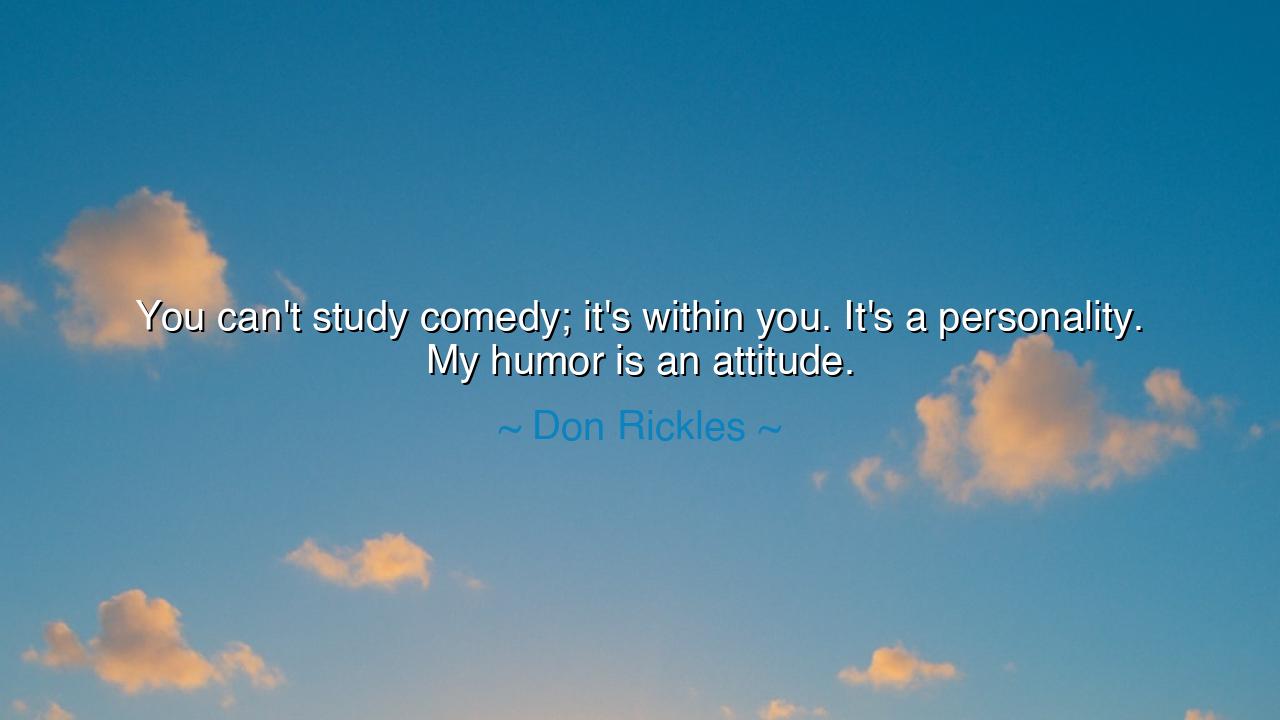
You can't study comedy; it's within you. It's a personality. My





Opening Scene
The room is softly illuminated by the fading light of the afternoon, casting long, warm shadows across the space. The hum of the city outside fades as the evening draws closer. Jack sits at the table, flipping through a book, while Jeeny stands by the window, gazing out at the world below, lost in thought. The atmosphere is quiet but comfortable, with an air of reflection lingering between them.
Host: Finally, Jeeny turns from the window, her voice breaking the silence with a tone of contemplation.
Jeeny: “You know, I came across something Don Rickles said recently, and it really got me thinking. He said, ‘You can't study comedy; it's within you. It's a personality. My humor is an attitude.’ It made me wonder — how much of what makes someone funny, or even how we approach humor, is rooted in who we are, in our attitude rather than just technique?”
Jack: “That’s such an interesting perspective. It’s like Rickles is saying that humor isn’t just about timing or structure; it’s about your personality, your outlook on life. It’s not something you can study or perfect. It’s something that comes from within, a way of seeing the world and reacting to it.”
Jeeny: “Exactly. Humor isn’t something you can force or craft in a traditional sense. It’s more about how you approach life, how you engage with others. The best humor often comes from the way we express our thoughts, from the attitude we bring to the situation. It’s that authenticity in how we respond to the world around us.”
Jack: “It’s true. The best comedians, like Rickles, don’t just tell jokes — they reflect their unique perspective. Their humor is an extension of who they are, of how they view the world. It’s about attitude, and that’s something that’s hard to learn. It’s something you either have or you don’t.”
Host: The conversation shifts, the weight of Rickles' words settling between them. Jeeny walks over to the table, her expression thoughtful, clearly reflecting on the deeper implications of what they’ve discussed.
Jeeny: “It makes you think about how we all have different ways of expressing humor, right? What makes someone funny isn’t just about the jokes they tell; it’s the way they engage with people, the way they see the world and how they choose to react to it. Humor is a reflection of personality, of how we process and respond to life.”
Jack: “Exactly. And that’s why humor is so personal. What’s funny to one person might not be to another, but that’s because humor isn’t about the setup or punchline. It’s about the energy and attitude behind it. It’s how we engage, how we bring our unique view of the world into the conversation.”
Jeeny: “It’s almost like humor is a lens through which we experience life. It’s not something you can fabricate — it comes from the way you interact with people, with the world around you. It’s the attitude you bring to every situation.”
Jack: “And that’s what makes humor so powerful. It’s a form of connection. When you’re authentically funny, when your humor is a natural extension of your personality, it creates a bond with others. It makes them see the world through your eyes, if only for a moment.”
Host: The conversation deepens as they both reflect on the nature of humor and its connection to personality. The weight of Rickles' words is clear now — that humor isn’t a set of skills to be learned, but a way of being, a natural expression of one’s outlook on life. Jack leans forward, clearly processing the idea, while Jeeny takes a seat across from him, her voice steady as she continues.
Jeeny: “So, humor isn’t about trying to be funny. It’s about embracing who you are, being genuine, and seeing the world through a lens that makes others smile. It’s not a technique, it’s a way of relating to the world and to people.”
Jack: “Exactly. And maybe that’s why the most memorable comedians are so unique. It’s not just their jokes that make them funny; it’s their attitude, the way they connect to their audience with authenticity. It’s that personal touch that turns something ordinary into something hilarious.”
Jeeny: “And I think it’s also about confidence in who you are. The funniest people aren’t necessarily the ones who tell the best jokes; they’re the ones who are comfortable with their own personality, who bring their true selves into the moment. Humor, like any other form of expression, thrives when you’re not trying to be anyone else.”
Host: The room falls into a quiet understanding, as though the conversation has revealed something deeper about humor and about how we connect with others. The world outside continues at its usual pace, but inside, Jack and Jeeny share a moment of realization that humor is not just about technique, but about attitude, authenticity, and the way we engage with the world around us.
Jack: “So maybe the key to humor isn’t in perfecting the craft, but in embracing your own unique way of seeing the world and letting that inform how you interact with others.”
Jeeny: “Yes, it’s about being authentic, being comfortable with yourself, and letting that shine through in everything you do — in your humor, your interactions, and your creativity.”
Host: The conversation wraps up, leaving behind a shared understanding that humor, like all forms of expression, comes from within. It’s not something to be forced or perfected, but something that flows naturally when we embrace who we truly are. Through that authenticity, we find not just laughter, but connection.






AAdministratorAdministrator
Welcome, honored guests. Please leave a comment, we will respond soon